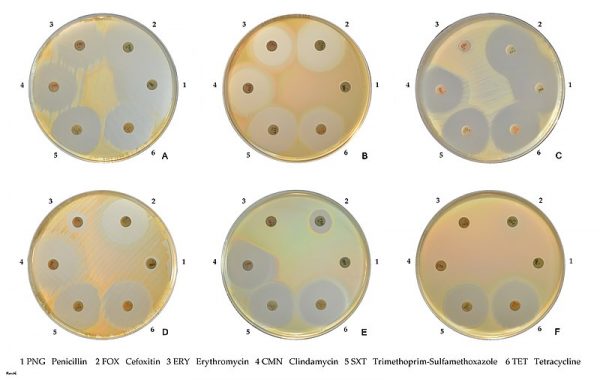
The European Center for Infection Control ECDC has sounded the alarm for hospital infections, as in Greece there is a rapid increase in resistant microbes with an increase in klebsiella by 38%, colibacillus by 54.7% and resistant staphylococcus by 8.2%.
At the same time, Greece ranks 3rd in terms of consumption of antibiotics and antimicrobial drugs overall, compared to other European countries.
These figures are included in ECDC’s recent reports on antimicrobial resistance in Europe and the actions to be taken to address it.

Staphylococcus aureus resistant to various antibiotics
According to the report on antimicrobial resistance, which for the first time includes data from all countries in Europe, the most common bacteria in 2022 were:
Escherichia coli (39.2%)
Staphylococcus aureus (22.1%),
Klebsiella pneumoniae (12.3%),
Enterococcus faecalis (8.2%),
Pseudomonas aeruginosa (6.1%),
Enterococcus faecium (5.9%),
Streptococcus pneumoniae (3.7%) and
Acinetobacter spp. (2.5%).
Based on the above percentages, there is an increase in Pseudomonas and Streptococcus pneumoniae compared to 2021.
The EU Council within the framework of the program “One Health” has set as goals for 2030 the reduction of antimicrobial resistance and a reduction in the frequency of infections of the circulation of resistant microbes in the blood, by 15% in methicillin-resistant staphylococcus aureus (MRSA), by 10% in third-generation cephalosporin-resistant E. coli (E.coli) and by 5% in carbapanem-resistant Klebsiella pneumoniae, compared to 2019 incidents.
In the new report, based on data from 2022, bloodstream infections in the EU saw a decrease in methicillin-resistant MRSA and resistant E. coli compared to 2019, however carbapanem-resistant Klebsiella increased by almost 50%.
Antimicrobial resistance rates remain high in the EU/EEA and are of concern, with continued increases in carbapenem-resistant Klebsiella pneumoniae (by 10.9% in 2022) and vancomycin-resistant enterococcus E. faecium (by 17.6% in 2022 ).
The report highlights the reduction of Acinetobacter spp. compared to 2021, but also the significantly increasing trend in the average rate of resistance to macrolides and penicillin and their combination in streptococcus S. pneumoniae in the years 2018–2022.
Regarding the three main microbes for which the targets have been set until 2030:
Methicillin-resistant staphylococcus. In Europe the frequency of incidents was 5.63 per 100,000 population and in our country 4.59 in 2019 and until last year the frequency decreased by 12.2% in Europe, while in Greece it increased by 8.2%
Escherichia coli resistant to third generation cephalosporins. In Europe the frequency of incidents in 2019 was 10.42 per 100,000 population, compared to 2.58 incidents in Greece. Until last year, however, incidents in Europe decreased by 16.8%, while in our country they increased by 54.7%
Klebsiella pneumoniae resistant to carbapanems. In Europe the frequency in 2019 was 2.18 per 100,000 population, but in Greece the incidence reached 13.05. Here the increasing trend was common, both in Europe and in Greece, with the percentages reaching 49.7% and 38%, respectively.

E. coli in fibroblast culture
Consumption of antibiotics
The third place in the consumption of antimicrobials after Slovakia and Bulgaria was occupied by Greece based on the data of 2022, but when it comes to treatments from the pharmacy, there Greece holds the lead.
Regarding the consumption of antimicrobial drugs for 2022, the consumption of daily doses per 1000 inhabitants in both the community and hospitals is used for comparison.
The average consumption in Europe was 19.4 daily doses per 1000 inhabitants, with countries recording daily consumption from 9.1 to 33.5 doses. Of these 17 doses were for community treatments with a daily consumption ranging from country to country between 8.3–31.2 doses.
These doses are significantly increased compared to the previous two years, but are significantly reduced compared to the previous 10 years. A statistically significant upward trend for 10 years was observed in Bulgaria and Cyprus.
Average total consumption of systemic antibacterials fell by 2.5% from 2019 as the reference year, showing slow progress towards the EU’s 20% reduction target by 2030.
No statistically significant correlation was detected over the five-year period 2018–2022 for total consumption (community and hospital sector combined) of antifungals for systemic use.
Regarding hospitals, the average consumption was 1.61 daily doses per 1000 inhabitants with a range of 0.75–3.15 doses from country to country, showing a significant decrease compared to the previous 10 years, although a significant increase was recorded in Bulgaria and Croatia.
In Greece, the consumption of antimicrobics reached 34.1 doses in 2018 and 2019, decreased to 28.1 doses in 2020 and 23.5 doses in 2021, while last year it returned to 32.9 doses for treatments both in the community and in hospitals. Overall, over the three years, it is estimated that there has been a decrease of 3.5%.
Latest News

Greece Prepares for State Budget Vote as Debate Reaches Final Stages
Prime Minister Kyriakos Mitsotakis is expected to deliver his remarks late in the evening, shortly before the decisive vote that will conclude the session

DM Dendias: We talk With Turkey But We Always Bring Up Their Unacceptable Positions
Second and last day of closely watched conference, entitled 'Metapolitefsi 1974-2024: 50 Years of Greek Foreign Policy', also included appearances by PM Mitsotakis, Ex-PM Tsipras and PASOK leader Nikos Androulakis, among others

Rhodes Airport Tops Fraport Greece’s Regional Airports in 2024 Performance
According to Fraport's data, more than 35 million passengers (specifically 35.2 million) were handled by Fraport-managed airports during the 11 months.

European Central Bank Cuts Interest Rates by 25 Basis Points
It is the fourth cut of interest rates by Europe’s central bank, a move expected by the markets and financial analysts leading to the rate settling at 3%.

Airbnb: New Measures Add €600 in Extra Costs for Property Owners
Property managers face an immediate administrative fine of 5,000 euros if access to the inspected property is denied or any of the specified requirements are not met.

Economist: Greece Included in the Best Performing Economies in 2024
Meanwhile, Northern European countries disappoint, with sluggish performances from the United Kingdom and Germany.

EasyJet Expands Its Routes from Athens
The airline’s two new routes will be to London Luton and Alicante and they will commence in summer 2025.

Capital Link Forum Highlights Greece’s Economic Resurgence; Honors BoG Gov Stournaras
Capital Link Hellenic Leadership Award recipient, Bank of Greece Gov. Yannis Stournaras, an ex-FinMin, was lauded for his pivotal role during Greece’s economic recovery

Tourist Spending in Greece Up by 14%, Visa Card Analysis Shows
Greece’s capital Athens emerged as the most popular destination, recording a 17% increase in transactions with Visa cards, surpassing even the cosmopolitan island of Mykonos.

Inflation in Greece Unchanged at 2.4% in Nov. 2024
The general consumer price index (CPI) posted a 0.4% decrease in November compared to the previous month



![Φυσικό αέριο: Δυναμικό come back του LNG στην Ελλάδα [γραφήματα]](https://www.ot.gr/wp-content/uploads/2023/01/OT_naturalgas-90x90.jpeg)











![Fraport: Πάνω από 35 εκατ. επιβάτες στα αεροδρόμια το 11μηνο – Πτώση στη Μύκονο [πίνακας]](https://www.ot.gr/wp-content/uploads/2022/06/fraport-90x90.jpg)


























 Αριθμός Πιστοποίησης Μ.Η.Τ.232433
Αριθμός Πιστοποίησης Μ.Η.Τ.232433